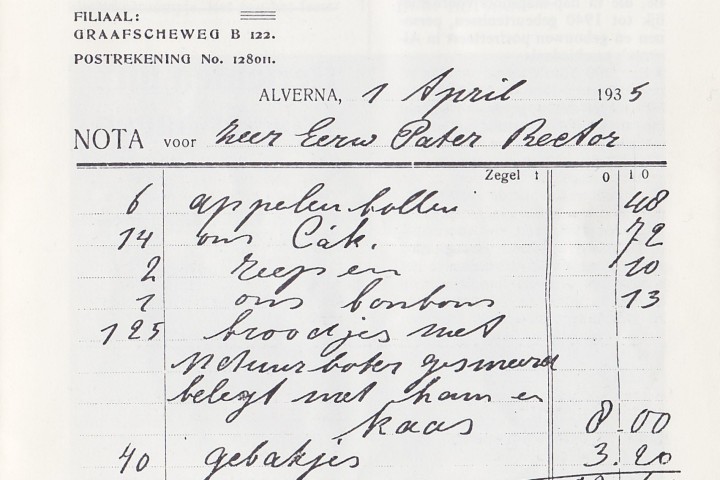
Artisan bakers, not in it for the money…
My grandfather (born in 1899) was, what you would now call, an artisan baker. But in the 1930’s it was just called a baker of course. He got up between 3 and 4 in the morning, did everything by hand and baked his bread in a wood fired oven (a ‘Den Boer’). When the weather was hot he would have difficulty decorating cakes, because the cream would be too runny. He only had a cellar, no fridge. Mid 1930’s he got an electric mixer to knead his dough. Of course this fact was immediately advertised as it was a sign of great progress. Later he also drove a Ford model T (Thin Lizzy) that had to be started with a hand crank, because next to baking, he also had to do the delivery of the baked goods (this was first done by bike with a big wicker basket to carry the bread). For his drivers license he had to drive up and down the street.
We now look back on all this as quite romantic times. But of course it was just really, really hard work for little money. Maybe that is the reason he never talked about his baking days (when I got to know him he’d already retired) and I never saw him bake anything. His children never followed in his footsteps, having seen what life as a baker was like. Every time my mother sees us baking bread or hears about our methods, something of what my grandfather did springs back into memory. “Opa (grandpa) also used to handle the dough in such a way”. “Now I remember him putting the rye bread in the oven after the other bread”. “He had this little device to make speculaasjes (ginger cookies)”. “Yes, he shaped the rolls that way too”.
Of course I wish I could have talked with him about his baking. I also wish people would have been more appreciative of his craftsmanship and skills (something we artisan (home) bakers now all aspire to. We now get compliments on our bread, which is nice, but I hope people told him they loved his bread too and they didn’t take it for granted that it was there, fresh for the taking every day. I also wish more things had been left that belonged to his old bakery. I have been to a few bakery museums and all the stuff you find there would be quite similar to the way my grandfather ran his bakery and store.
One thing that is interesting to see is the bill in the picture that dates back to 1935. It shows the cost of an order from the local Franciscan Monastery in the hamlet of Alverna near the town of Nijmegen. By the looks of it, there was something to celebrate (these monks, followers of Francis of Assisi, probably didn’t eat cake and chocolate every day)!
Here’s a translation with prices in euro (then it would have been Dutch guilders):
- 6 apple dumplings 22 cents
- 1.4 kilo cake 32 cents
- 2 bars of chocolate 4.5 cents
- 100 g chocolates 6 cents
- 125 bread rolls with dairy butter and ham and cheese 3 euro 63 cents
- 40 assorted cakes and tartelettes 1 euro 45 cents
____________________________________________________________
Total bill a little under € 5,75
After some research I was able to deduct that would have the purchasing power of € 80 to € 100 euro. It would probably get you the 40 cakes but no more than that.



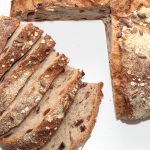

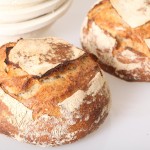
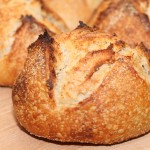
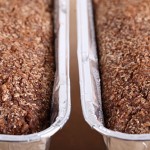

Gabriela says
Very, lovely, story! Worthy of thinking about, with all respect to any artisan/grandpa of any of us. Hearing It made the saturday even nicer.
Thanj you. Greetings from México
Weekend Bakers says
Thank you so much Gabriela for your lovely and heartfelt words. No matter where we live, we feel the same about our grandfathers!
Greetings from the tiny Kingdom of the Netherlands 🙂
Sandro Alves De Brito says
Your history inspire me to say for the first time the my history.
Weekend Bakers says
Hello Roger,
Thank you so much for sharing your inspirational story with us! I hope one day we can taste your special cakes with a Brazilian background.
Wishing you all the best and a wonderful and very successful New Year in Munich!
Ed & Marieke
Holland
Sandro Alves De Brito says
I born in a small family in south of brazil called Curitiba.
I can remember how many nights I had slept with the noise of the mixer of my Mather at kitchen to fill orders of B-Day cakes for the next day, she almost took orders of B-Day cakes from nears neighbour around the italian Village (Santa Felicidade) where were we living of and she was every weekend quite bussy and your cakes getting very famous for a very softer dough and icing. All this to help the finances at home. Today 30 years later with full luggaged of expirencies in between london, milan and also as a cabin crew I change the sky’s for the ground and as opposed to unregular passagers I decide to care about my regular guestes. On 24/10/11 with the help of my 24/7 Mentor Guru Alexander/Wien I opened in munich
“Copa wein&delibar”Sendlingerstr.7 München D-80331 and with the same passion of my Mather and with out any recipe I still impressing customer with the crossover cakes creations from south brazil with a lot of influences of the Europeans emigrants in south of brazil.
It was the right choose between airplane noise and mixer noise! Today for me mixer noise means thats is celebration time and be a shareholder of happiness and romantic moments with a gorgeous or a simple delicious Cake.
Sandroalvesdebrito
Thank You all.
Marieke says
Thank you for your kind words Isa. I know exactly what you mean. Baking good bread can be rewarding on so many levels. I really hope your message gets through in your community! We see people here enjoying and thriving on good bread. Wish you all the best with the baking and lots of wonderful bread and people who appreciate it!
Marieke & Ed
Alfred says
Very nice story about our grandfather the Baker !!
isa says
Nice story. im a baker in the caribbean and its a hard work to do good bread without chemical stuff.
The difference between a commercial bread and artisan bread is that artisan give you a better live, better health, commercial bread are making sick our people and just good bakers care. Potassium Bromate use in the bread making in my country are killing us. Bakers are people that care about others, no money can pay the hard hard work. This is work for love.